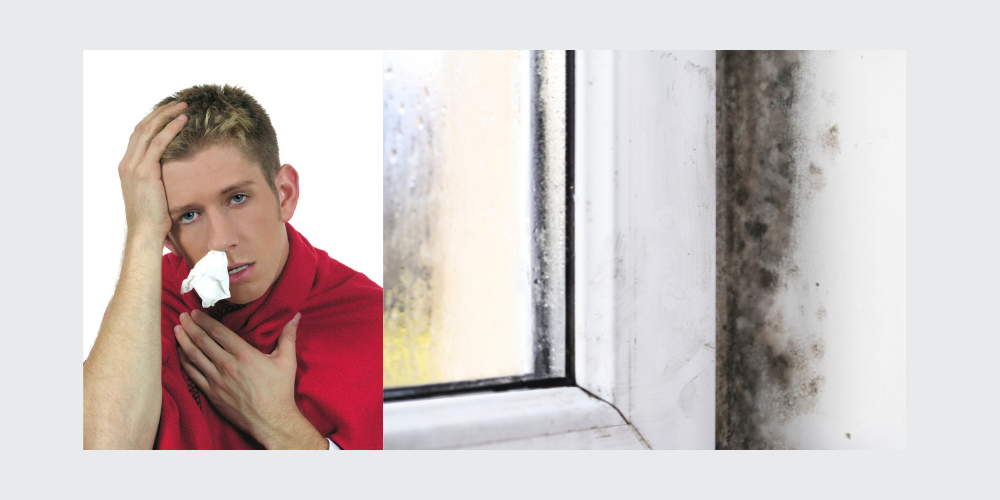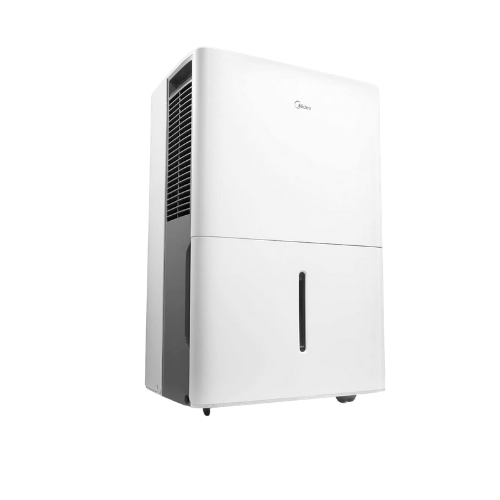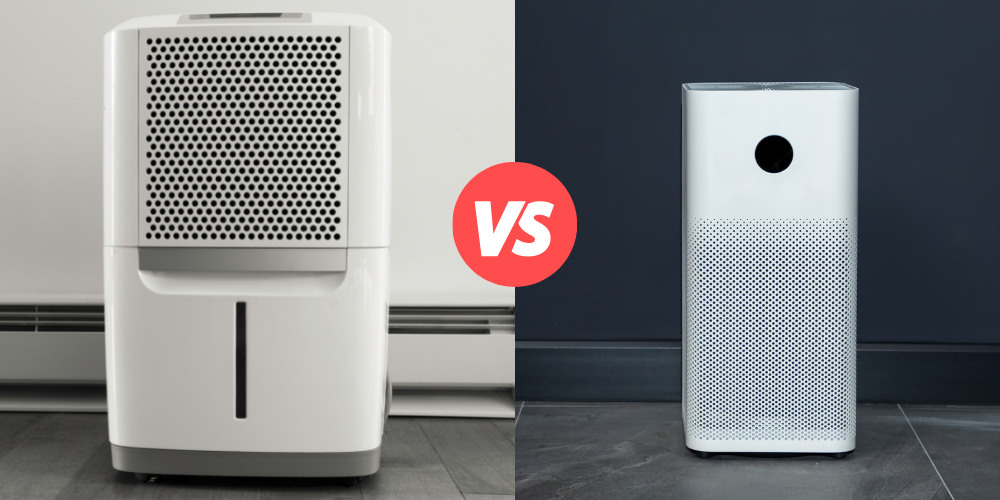What is better a dehumidifier or air purifier?
3 Key Takeaways:
🚀 The post suggests that both dehumidifiers and air purifiers can be essential in the same room, but sometimes just one or the other might be sufficient.
🚀 It explains that dehumidifiers are designed to remove moisture from humid environments, while air purifiers are designed to filter indoor air pollutants.
🚀 The blog post discusses the differences between a dehumidifier and an air purifier, and how they both work to improve indoor air quality, reduce airborne contaminants.
Keeping the indoor air quality perfect must be a priority. Little do we worry about the air that we breathe in and the need to improve indoor air quality on a daily basis. The battle between air purifiers and dehumidifiers is constantly ongoing. Many homeowners are often faced with the doubt of which one to purchase and what’s a better choice- an air purifier or dehumidifier or both dehumidifier and air purifier.
We must remember that although air purifier vs dehumidifier is a discussion, both an air purifier and dehumidifier come with their differences. The manner in which dehumidifiers work cannot be a substitute for air purifiers. Let us discuss in detail the benefits and functions of both an air purifier and dehumidifier and which device is a better choice to improve air quality for your home’s air.
Do you need a dehumidifier if you have an air purifier?
As aforementioned how dehumidifiers work is different from the functions of an air purifier. Dehumidifiers are designed to remove moisture from humid environments. High relative humidity levels in a home’s air are hazardous. A dehumidifier comes with the ability to remove excess moisture levels and monitor the humidity levels in your home.
Excess moisture in the air increases the relative humidity levels of the space. High humidity levels contribute to high humid environments. A humid environment is not uncomfortable, rather it comes with many problems from the excess moisture build-up. Removing excess moisture will be crucial at this point.
A dehumidifier can extract the excessive moisture from the air, turn into water vapor by the process of condensation then reduce it to water. By removing excess moisture from the humid environment, you will be able to maintain the indoor humidity level of the place.
The room’s humidity levels can be monitored as well using an electronic dehumidifier. Excessive moisture and excess humidity level can be brought under control in humid environments only using an electronic dehumidifier or a desiccant dehumidifier and not with an air purifier.
Hence, if your room’s humidity level is high and tackling this excess humidity level and removing the excessive moisture is your priority, you will need a dehumidifier and air purifier. However, if you only want to improve air quality and reduce moist air and working on the moisture levels is not essential, you can do well with just air purifiers.
Here is what both air purifiers and dehumidifiers can do for the air in your home. They both can clean air, reduce airborne contaminants, reduce airborne allergens, remove dust mites, mold spores, remove the musty smell or damp odors, trap pet dander, etc.
Moist air is famous for supporting mold growth and mold spores, dust mites, pet dander, airborne contaminants, musty smells, and causing damage to the respiratory system. Allergy sufferers and those with a poor respiratory condition must invest in air purifiers and dehumidifiers to get cleaner air.

A damp environment thrives only when the humidity levels of the place are high. You can have air purifiers and dehumidifiers in the same room to get the cleanest air, especially when you have allergy sufferers in your home. You can get a healthier living environment with an air purifier that traps airborne contaminants and airborne pollutants or harmful pollutants, mold spores, pet dander, can remove dust mites, smoke particles, and ensure you get the cleanest air. The high-efficiency particulate air filter or the HEPA filter, UV light, Ultra low penetration air, Ultraviolet radiation, activated carbon filter, etc are the various contents air purifier has to perform their function and provide the cleanest air.
However, preventing mold spores and mold growth, reducing dust mites and airborne contaminants, pet dander, musty smell, etc., can be done only if the humidity level and excess moisture in your home’s air is brought under control. Working on moist air by passing air over the cool surface of the refrigerated coil. extracting the excess moisture from the air, and having the collected water removed from the humid space can be done only by a dehumidifier. Turning moist air into dry air is the only way excess humidity levels and moisture can be taken care of, be it by a desiccant dehumidifier or by an energy efficient electric dehumidifier. A dehumidifier can improve indoor air quality, give you clean air and still remove excess moisture and humidity level. This cannot be done with air purifiers.
Do dehumidifiers have HEPA filters?

Some advanced dehumidifier models come with HEPA filters installed in them. HEPA filtration or high efficiency particulate air is the highest form of air filtration mechanism. It can make the air cleaner like no other device. Some dehumidifiers come with an activated carbon filter on them to make the air cleaner and free from mold spores, dust mites, and airborne contaminants.
Although air conditioners, dehumidifiers, and HVAC systems come with filters to clean air, only an air purifier unit will have a true HEPA filter. The contents air purifier can come with is advanced and of various types. To get the cleanest air and the best indoor air quality even in damp environments, you must get air purifiers and not dehumidifiers. However, a dehumidifier with HEPA air filter is an excellent choice to handle humidity levels in humid environments and still give you indoor air that is dry and free from mold growth and mold spores, dust mites, musty smell, etc.
Which is better air purifier or dehumidifier?

As discussed above, in the battle air purifier vs dehumidifier there is no winner. Both dehumidifiers and air purifiers come with unique functions. Air purifiers and dehumidifiers might be essential in the same room sometimes just air purifiers or dehumidifiers alone might be sufficient. Whether you need an air purifier or dehumidifier depends on your requirement.
Removing excess moisture and tracking the fluctuations in humidity levels can be performed only by a dehumidifier. If your aim is to have a home that has the humidity level maintained and free from excessive moisture you will find the dehumidifier helpful. You must remember that most homeowners find a dehumidifier a wiser pick when it comes to air purifier vs dehumidifier. This is because air purifiers can give you clean air alone. But, a dehumidifier can work on the moisture and humidity levels of the area which is the source of problems. It is also possible to integrate a dehumidifier into the HVAC systems or air conditioning systems of a home. Air conditioners can cool air and still affect the humidity slightly. If an air conditioner is able to reduce the humidity level in the room and you find an air conditioner sufficient you can lean in with that choice.
Maintaining the best of respiratory condition, getting the cleanest air, and a device to not just remove dust mites and mold spores, but a unit that can offer protection even from smoke particles is an air purifier. Only air purifiers come with air filters that are designed to offer the best protection. They can even remove dust from the dry air, moist air, and damp environment. Air purifiers have air filters in them that are advanced to offer exceptionally clean indoor air.
Ionic membrane
Some air purifiers make use of the mechanism of the ionic membrane. An air purifier with ionizer negative ions, which will then merge with the positive ions in the air. In this ionic membrane interaction, the charged ions that are heavier will fall due to their weight. As a result of this ionic membrane function, the air purifiers can give you clean air.
Ozone generators
Ozone generators or ozonators split oxygen molecules in the air into a single atom. The resulting single atom then merges with other oxygen molecules thereby forming ozone.
UV air purifier
An air purifier with UV light will damage the DNA of viruses and bacteria. Safer and cleaner air is yours with an air purifier using UV radiation. This is also an excellent choice to keep mold spores away.
Wondering which is the best air purifier and dehumidifier all in one?
Tenergy Sorbi 1000 ml Air Dehumidifier
Removing excess moisture from the indoor air and still keeping it clean from dust mites, pet dander, mold spores, musty smells, is possible with the Tenergy Sorbi Air purifier and Dehumidifier combo. If you’re wondering which is better in the battle air purifier vs dehumidifier, you can consider choices like this unit to remove moisture and keep your environment dry.
Moist air is turned to dry air by this unit. It can remove 750 ml water per day and is a portable dehumidifier, making it easy for you to put it to use where needed. Passing air over cool surface coils and removing moisture is done seamlessly. The collected water is stored in the 1-liter water tank.
Along with humidity levels maintained in the indoor air, you also get improved air quality with the HEPA filter. Other features like LED indicator, touch panel, simple design, water level indicator, 2-year warranty, etc., make this air purifier and dehumidifier combo the best choice for a home.
FAQ Section
1. Does air purifier work for coronavirus?
Getting the cleanest air is possible only with an air purifier. Although we now know that between air purifier vs dehumidifier, an air purifier is a better choice for air that is clean and free from mold spores and allergy sufferers benefit from it, air purifier or dehumidifier cannot offer protection against coronavirus.
One CAN NOT expect protection against COVID -19 in their indoor air by using air purifiers.
2. Is a dehumidifier or air purifier better for asthma?
Allergy sufferers and asthma patients will benefit from both air purifiers and dehumidifiers. Keeping the indoor air clean does not make the environment safe. Mold spores and other allergens will continue to proliferate if the room’s humidity levels are not continually monitored. Hence a dehumidifier that runs the humid air over the refrigerated coil to completely remove the humidity from the area is essential.
Water vapor, cool mist, be it any outlet from the unit, they all can be free from mold spores, airborne allergens, with the help of a dehumidifier. Air conditioners, an ionic pump, heat exhaust, air purifiers, no matter which device you; having a dehumidifier at home to keep the humidity levels under check will be the best choice for those with asthma. Be it a desiccant model or a traditional design with a Peltier heat pump.
3. Does dehumidifier get rid of smells?
Yes. A dehumidifier can help you keep your home smelling fresh and free from musty odor. When the humidity levels are maintained and the dampness from the area is removed, the musty smell that arises from mold spores, fungi, water vapor logged walls and furniture will leave the area.
4. Do air purifiers increase oxygen?
There is no evidence to prove that air purifiers increase the oxygen levels in the room. However, it is said that some air purifiers do take up oxygen, but they do not reduce the oxygen levels by which you should be alarmed.
Humidifiers on the other hand are known to increase the oxygen levels in a room. This will help to reduce fatigue, headaches, and improve sleep. Increasing indoor air oxygen levels can be brought up in a number of ways. For example by making healthy air circulation of indoor air possible, having good plants that improve the quality of indoor air, etc.
5. How can you tell if you have mold in your lungs?
Allergic bronchopulmonary aspergillosis (ABPA) is the term used for an allergic reaction that arises from mold infecting the lungs. You can identify this with certain symptoms and get it diagnosed medically. The symptoms can vary for each person but they primarily include; wheezing, coughing, fever, headaches, chest pain, and difficult breathing.
Wrapping Up
With this, we have reached the end of the article. We trust you are clear on which is a better choice in Air purifier vs dehumidifier. Based on your requirements and priorities, you can invest in air purifiers or dehumidifiers. Share with us your experiences on using an air purifier to maintain the quality of indoor air and with a dehumidifier that helps keep the home’s air dry and moist-free.

About The Author
Olivia — a self-confessed air quality addict — is a home climate enthusiast, fresh air advocate, and someone with deep personal experience and knowledge about mold extermination. Her work was mentioned in countless notable humidity publications. Previously she was an editor at Mold Remediation.